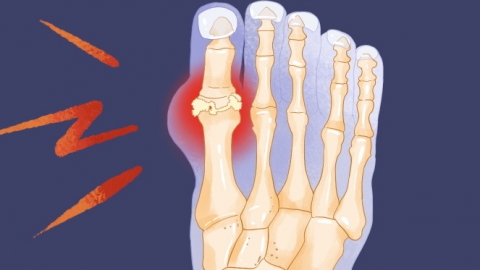What causes high uric acid levels?
Generally, high uric acid levels may be caused by congenital weak uric acid excretion, abnormal purine metabolism enzymes, high-purine diet, obesity, chronic renal failure, and other factors. If experiencing discomfort, timely medical consultation is recommended. Detailed analysis is as follows:
1. Congenital Weak Uric Acid Excretion
Some people have inherent differences in kidney excretion function, resulting in naturally weaker uric acid excretion ability, which can easily lead to uric acid accumulation in the body and cause high uric acid levels. These individuals should pay special attention to their daily diet, strictly control intake of high-purine foods such as animal offal and seafood, drink more than 2000 milliliters of warm water daily to increase urine output and promote uric acid excretion, and regularly visit hospitals to monitor blood uric acid levels to keep track of their health status.
2. Abnormal Purine Metabolism Enzymes
Congenital abnormalities in enzymes involved in purine metabolism can lead to metabolic disorders, causing excessive uric acid production and resulting in high uric acid levels. Daily routines should maintain regular sleep patterns, avoid staying up late and excessive fatigue to prevent disruption of the body's metabolic state. Light exercises such as walking or yoga can be performed appropriately to enhance metabolic capacity. Diet should be light, reducing intake of high-fat and high-sugar foods to alleviate metabolic burden on the body.

3. High-Purine Diet
Long-term excessive intake of high-purine foods such as animal offal, concentrated meat broth, and seafood can increase purine levels in the body. After metabolism, this leads to increased uric acid production, resulting in elevated uric acid levels. Adjust dietary structure by reducing high-purine food intake and increasing consumption of low-purine foods such as vegetables, fruits, and milk. When cooking, try to use steaming, boiling, or stewing methods, avoiding frying or sautéing to reduce purine content in food.
4. Obesity
Obesity can cause metabolic disorders in the body, not only increasing uric acid production but also affecting the kidneys' ability to excrete uric acid, thereby causing high uric acid levels, possibly accompanied by abnormal blood sugar and lipid levels. Weight should be controlled through reasonable diet and exercise, such as engaging in aerobic activities like jogging or swimming 3-5 times per week for about 30 minutes each session. Diet should control total calorie intake, reduce consumption of staple foods and high-fat foods, and eat more foods rich in dietary fiber. If lifestyle interventions are ineffective, weight-loss medications such as orlistat capsules may be used under a doctor's guidance.
Patients with chronic renal failure experience gradual kidney function decline, significantly reducing their ability to excrete uric acid, leading to large accumulations of uric acid in the body and resulting in high uric acid levels. As the condition progresses, uric acid levels may continue to rise. Treatment of the underlying disease should be conducted under a doctor's guidance, along with uric acid-lowering medications such as allopurinol tablets or febuxostat tablets to inhibit uric acid production. If there is significant impairment in uric acid excretion, benzbromarone tablets may be used to promote uric acid excretion. Daily attention should be given to a low-salt, low-protein diet to avoid increasing the burden on the kidneys, and regular follow-up tests for kidney function and blood uric acid levels should be conducted.
In daily life, smoking should be avoided and alcohol consumption limited, especially avoiding beer, white spirits, and other alcoholic beverages; maintain regular sleep patterns and avoid excessive fatigue; maintain a positive mindset and avoid mental stress.










